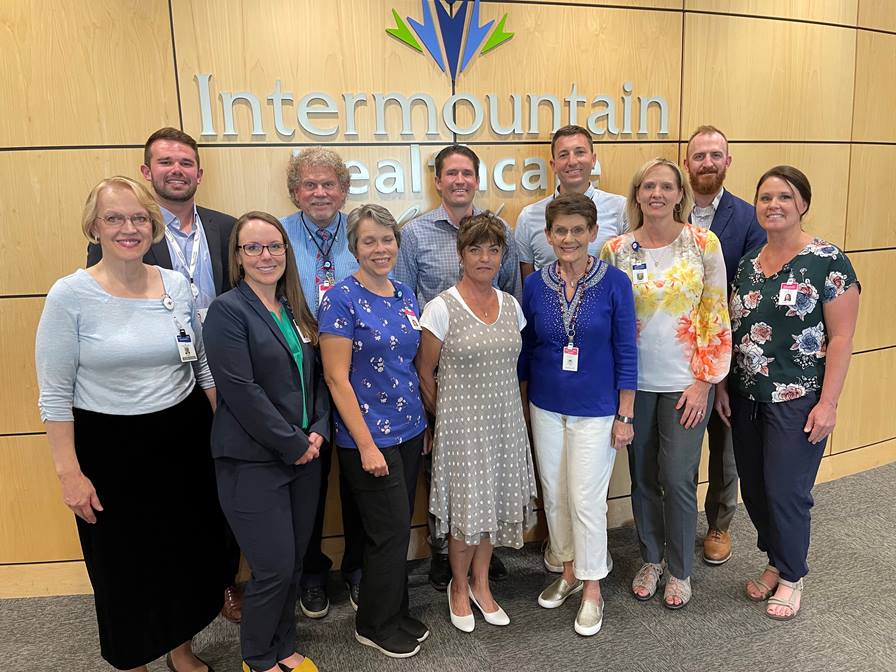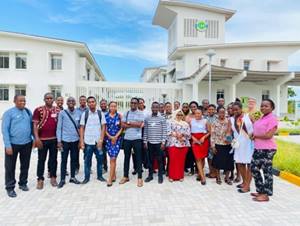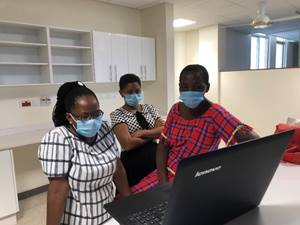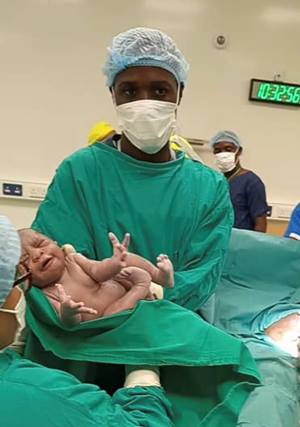
A team of Intermountain caregivers has spent more than a year helping launch a new women and newborn hospital service in Tanzania, all without ever stepping foot in Africa. And in addition to making a huge difference in the lives of many people on the other side of the globe, they’ve been able to bring many lessons back home to Intermountain patients.
It all started when staff at the Comprehensive Community-Based Rehabilitation in Tanzania (CCBRT), a rehabilitation hospital in Dar es Salaam, Tanzania, realized many of their patients needed rehabilitation care because they hadn’t received very good care at birth. Many patients had been born prematurely or had some birth trauma, and as a result they needed long-term care. The CCBRT team decided to build a women and newborn hospital on their campus, called the Maternity Wing, to prevent birth problems and ensure better outcomes for moms and their babies. The new facility would focus especially on high-risk pregnancies and complex deliveries that could end in birth trauma.
The hospital team eventually partnered with Business for Health Solutions (BHS), a global non-profit that develops the capacity of local healthcare enterprises in Africa by facilitating remote business and technical support delivered by teams of corporate volunteers. Tyler Nelson, BHS director, started looking through LinkedIn for potential volunteers and found Shannon Clegg, RN, a strategic consultant with the Intermountain Strategy Office. Shannon has many years of experience in women and newborn care, she’s worked in healthcare leadership roles, and she’s also done lots of volunteer and humanitarian work around the world. Tyler thought Shannon was a perfect fit for the Tanzania project. The two connected and soon Shannon had assembled a team of volunteers, mostly from Intermountain, to help.

Members of the Maternity Wing staff in front of the facility.
“The initial ask was to focus on the building itself,” Shannon says. “We were helping with things like facility occupancy planning and process flow analysis. How do they move their patients through effectively? What are they missing? They also asked us to review their equipment lists to make sure they weren’t missing anything they were going to need.”
Shannon coordinated with Emily Stirling, Intermountain’s caregiver social wellbeing manager, who agreed caregivers could volunteer to help in this unique opportunity. Then Shannon enlisted the help of Patrick Lemmon, executive project manager for Specialty-Based Care, Cory Duvall, Continuous Improvement assistant vice president, and Blake Fessler from Castell to help with facility planning and process improvement.
Later, Shannon brought on more people to help with clinical education and policy review, including Stephen Minton, MD, neonatologist at Utah Valley Hospital, Kathy Bybee, RN, a nurse educator from McKay-Dee Hospital, and Shannon’s mother, Deanne Francis, RN, who had recently retired after working 58 years with Intermountain as a NICU nurse, prenatal educator, and lactation consultant. Developmental specialists Karin Sharp and Barbara Terrill also joined the team, along with Andrew Keim from Pharmacy. Caleb Frischknecht and Anitta Hakkinen from the Office of Intellectual Property also helped by reviewing all materials Intermountain shared with CCBRT to ensure everything was compliant. Plus, J.D. Drasbek from HCA Healthcare joined to help the Tanzania team set up their blood bank, lab, and morgue.

The Maternity Wing's three nurses joined the Intermountain volunteers for early morning virtual trainings.
“I helped with feeding skills, particularly breast feeding, and breast milk feeding when direct feeding at the breast isn’t possible because of prematurity, sick babies, or sick mamas,” says Deanne. “If we could improve breastfeeding rates to recommended levels, and make sure birth attendants are well trained to handle problems in the first five minutes of a baby’s life, we could save more than a million lives annually around the world. This project was a small step in that direction.”
The work by Intermountain caregivers was done totally on a voluntary basis. Intermountain did provide training resources for the Tanzanian staff, but no financial support. The volunteers gave recommendations on patient flow and workflow plans for the new infrastructure, staffing plans, clinical standard operating procedures, education modalities, and guidelines for an in-house static blood donation unit.
“We did Zoom trainings with them,” Shannon says. “It was so awesome. The nurses would come in with the doctors and we would do trainings like we would here.”

The first baby born in the new Maternity Wing, held by Daniel Michael, MD.
The results of all the hard work were finally realized when Brenda D’Mello, MD, an OB/GYN and medical director of the Maternity Wing, joyfully reported to Intermountain volunteers on January 3 the birth of the first baby delivered in the new Maternity Wing.
“Celebrate with me for the joyful cries of a healthy baby girl born today at CCBRT Maternity Wing,” Dr. D’Mello said. “All is well with mum, baby, and supporters—achieving 100% compliance with the latest World Health Organization standards for quality care. Thank you to all who made this happen. It has been a long road and now we have the rainbow. Hope for a great 2022.”
Dr. D’Mello says they’ve now had multiple successful deliveries since the facility opened, including a set of twins. They also had a woman come in for a routine pregnancy check-up and the nurse, following training she received from Intermountain volunteers, noted a problem and was able to quickly respond. The team determined it was a placental abruption and were able to deliver a healthy baby via C-section within 20 minutes.
“I’m so grateful, I see the favor of God on CCBRT,” Dr. D’Mello says. “Warmest regards to the intermountain team.”
The project not only helped the CCBRT team—it also taught the Intermountain team valuable lessons that can help them improve care back home in our facilities.
“We were all volunteers with lots of experience here, but with no experience in trying to open a maternity hospital in Africa with limited resources,” Deanne says. “This was definitely a two-way learning experience for all of us.”
A few examples of things the Intermountain team learned from CCBRT:
- Recognizing the value of skin-to-skin contact for mother and baby. In Tanzania they don’t always have access to radiant warmers or isolettes to keep small babies warm, so the mother becomes the natural “warmer” with the baby laying skin-to-skin on the mother’s bare chest. This isn’t just at birth, but often throughout the infant’s stay in the NICU. The mother’s body temperature can actually adjust to help warm the baby. Shannon says many studies show this method is much better for mother and baby than other methods commonly used in the U.S.
- Teaching and empowering mothers to better care for their new infants. Because they have so few nurses in Tanzania, they rely heavily on the new mother to provide much of the care for herself and her child. The nurses focus their limited time on teaching the mother how to provide the best care herself. As a result, the mothers are well prepared to continue caring for their child after they go home.
- Breast feeding. Mothers in Tanzania have far better breastfeeding success rates than in the U.S. in part because they don’t have many other options. “What a revelation to find that there are places in the world where mothers and babies aren’t separated, and where formula and bottles are simply not used because they aren’t an option,” Deanne says. “Wow!”
- Conserving resources. The CCBRT team is extremely limited on resources, so they’ve found innovative ways to make supplies last and reduce waste. “I don’t think we realize here how richly abundant we are,” Shannon says. “They really do so much with so little and find ways to stretch resources.”
“I truly enjoyed facilitating the projects between CCBRT and Intermountain, and I saw firsthand how valuable the Intermountain team’s diverse expertise was for the CCBRT team,” says Mecklina Isasi, client engagement manager for BHS. “The discussions between BHS, Intermountain, and CCBRT made me realize that all healthcare organizations face similar issues—they only differ in the local solutions available. Cross-cultural learning is so important to increase access to quality healthcare globally, and it’s why BHS is committed to facilitating remote technical assistance that builds the capacity of organizations like CCBRT.”
“Working with the Intermountain Healthcare volunteers was an incredible and memorable experience,” says Skeeter Makau, volunteer engagement manager from BHS. “They exceeded expectations in their commitment towards supporting CCBRT, a demonstration of loyalty and excellence which we at BHS loudly applaud.”
“Sharing experience, clinical information, and training between two very different cultures located 9,500 miles apart has truly been an eye-opener for me,” says Deanne. “It has been amazing to see what can be accomplished remotely.”
“It was a choice experience to be involved with this volunteer project,” says Karin Sharp from McKay-Dee. “I looked forward to the late-night corroboration between continents. I was so impressed with all those wonderful professionals involved in Tanzania, working to create a NICU using best practices for their families and babies. Their eagerness and willingness to receive information was humbling, and their brilliance and gratitude was inspiring. I wouldn’t hesitate to volunteer in the future.”
Shannon says a key thing she learned from this experience is that with today’s technology you can have a positive impact on people around the world without having to leave home.
“I think we have people in this organization who really want these kinds of opportunities and they think they have to travel across the globe to do it,” Shannon says. “They think they’ve got to go to Africa or Belarus or Ethiopia. What I learned is you can make a huge difference without even leaving your house. You can make a huge difference from a distance. I wasn’t sure we were going to be able to really make those connections, but I found you can make incredible connections. Some of those people will probably be lifelong friends for a lot of us on the team.”
Shannon adds, “I feel like I've been so blessed to have the education I have and to live here where I’m so richly blessed with resources and people. Whenever I’m able to take that and share it in a meaningful way, that’s what ‘trips my trigger.’ That’s what gets me up in the morning. It just feels good at the end of the day, like you made a little dent—a little ripple.”
If you’re interested in learning more about this project, contact Shannon. If you’re aware of a similar project you’d like Intermountain to get involved with, contact Emily. If you’d like to learn more about BHS’ work to improve access to healthcare globally, you can email skeeter@businessforhealthsolutions.com.

